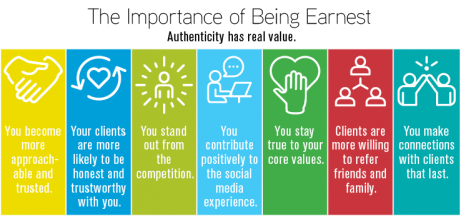Advice on how agents can use social media to create connections and boost sales
By Eric Schoeniger
Social media conventions lead some agents to present perfectly curated personas. But letting “the real you” shine through can create connections—and sales.
If you’re like many agents, you get a lot of business through referrals. Social media allows you to expand that sphere of influence.
But in our Photoshopped, Instagram-optimized era, some agents succumb to the temptation to post corporatized content and display perfectly coiffed lives.
“Our goal is to attract connections with people who want to do business with us,” says Cheryl Ashurst, CRS, a broker associate for RE/MAX Properties 2 in Montgomery, Alabama. “Wouldn’t it be a tragedy for someone to find out the ‘real you’ isn’t who you presented yourself to be?”
It’s not the medium, but the way you use it, believes Leslie Heindel, CRS, an agent for Crescent City Living in New Orleans. “I think some agents go to a seminar where someone tells them how to post,” she says. “But if you’re just doing what everyone else is doing, then it’s not the real you.”

Want to stand out from the social media crowd? Follow these do’s and don’ts:
Decide why you’re online.
Do you want to overtly promote your business? Do you want to simply connect with people? A clear purpose will help you meet audience expectations. “We mix in real estate, but no one wants to just see that you have a new listing,” says Betty Cannon, CRS, a partner with Ashurst at RE/MAX Properties 2. “We’re natural encouragers, so we want to help people. And we attract clients with a similar mindset.”
Be honest.
Don’t try to make your life or business look perfect. Don’t oversell your capabilities and expertise. “When people tout all the good things they do all the time, without some semblance of humility, it gets old,” notes Anna May, CRS, REALTOR®, a broker/owner for Realty World Neighbors in Hayward, California.
Authenticity, on the other hand, lets people get to know you. “Then I’m no longer fighting for their attention, and they’re more likely to work with me,” Heindel says.
Use your own voice.
Nobody likes corporate-speak. Your posts should sound the way you actually talk. “Agents juggle a lot of different tasks,” points out Donna Bruno, CRS, a real estate sales instructor for Coldwell Banker in Westchester County, New York, and Fairfield County, Connecticut. “So some may look to rely on predesigned content they can purchase. However, it doesn’t convey who they are. If people can identify with you, personally, your posts will resonate more.”
Have a conversation.
Remember, it’s social media. Don’t just talk. Listen and respond. Those personal interactions reveal the person behind the brand. “Talk about topics relevant to your clients right now—even if it’s not about real estate,” Bruno advises. “It will let them know you’re connected to their world.”
Post candid photos and videos.
A picture is worth 1,000 words. An undoctored photo is 1,000 times more authentic than a professional headshot. And be careful about posting highly filtered photos from 15 years ago that make you look younger or better than reality. The good impression you made online will be lost the moment your prospect meets you in person.
Also consider videos, which can have even greater value. “Live-streaming a video leaves you vulnerable,” Bruno admits. “But it lets people see there’s a real person behind the business.”
Share hobbies and activities.
Love gardening? Hooked on Star Trek? Sharing interests will let you connect with people on a personal level—and gain their trust. “I’m known for sharing photos of old bathrooms,” Heindel says. “So when I meet new clients, they show me photos of their grandma’s bathroom.”
Ashurst and Cannon created a Facebook group called Healthy Eating Montgomery. “Each week, we feature a local restaurant to show that you can find lots of places to enjoy a healthy lifestyle,” Ashurst says.
Avoid controversy.
Ashurst, Cannon, May and Bruno all advise keeping politics out of posts. But Heindel disagrees—with caveats. “I’m vocal about some political things, though not all,” she says. “You might scare off some clients. But they weren’t going to be a good fit for you anyway.” Still, it’s wise to avoid online arguments about controversial topics.
Follow through.
Show more than your personality. Demonstrate that you’re caring, professional and trustworthy. “I’ve become good at working with older clients who might be selling a home that has been in their family for decades,” May relates. “So I share those experiences online. I get a lot of referrals from this, and from their children and grandchildren.”
“We talk about topics we care about, from breast-cancer awareness to providing clean water in poor countries,” Cannon says. “When you share content that’s dear to your heart, people know you’re being genuine.”
Ultimately, social media authenticity isn’t just about appearing “real.” It’s also about acting on your values and doing what you say you will. That’s who you are. Make sure social media shows it.
The Genuine Article
Which social media platforms are best for your bona fides?
Facebook—The social media behemoth is probably the best designed to display your life and personality.
LinkedIn—The professional platform offers a great forum for combining business with a glimpse of who you are.
Twitter—People tend to say what they think on Twitter. Don’t overdo it, but let the platform reflect what’s important to you.
Instagram—“Insta” can be the land of Photoshop. Make sure your pics are real.
YouTube—Videos are a superb way to spotlight the real you in living color.
How can you create a strategy that works with your personality and strengths? Check out “Digital Marketing: Establishing a Social Media Brand” on CRS.com/catalogsearch.








